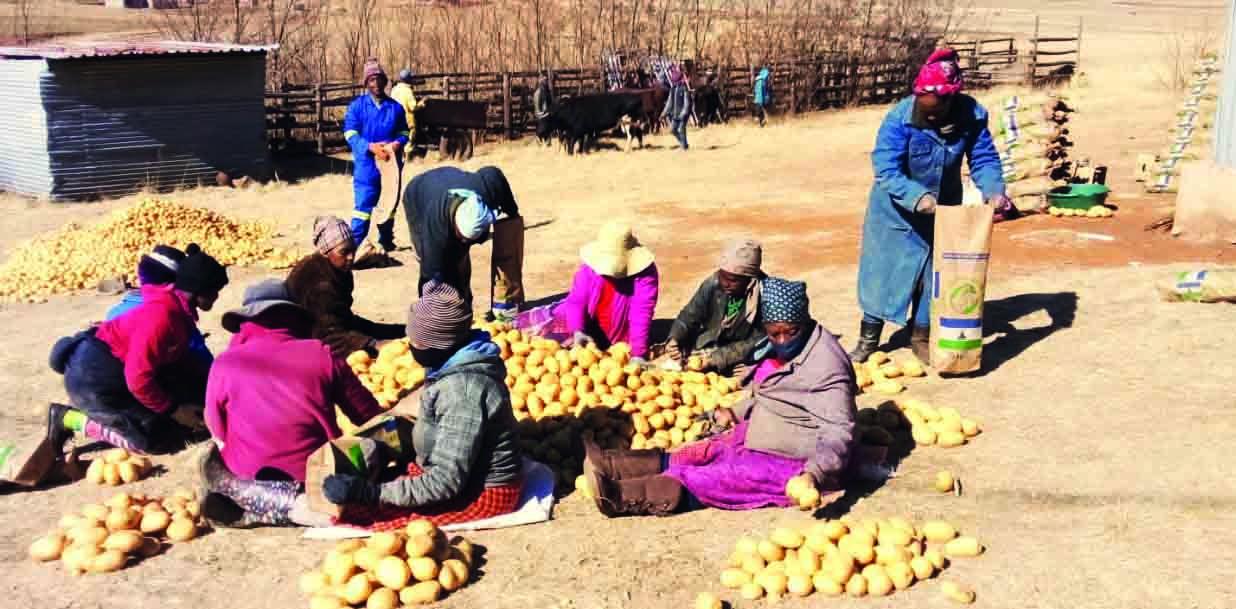Africa-Press – Lesotho. CAN any good come out of Matelile in Mafeteng district? The answer is an emphatic “yes”. The area, infamous for destructive famo gang wars that have left a host of widows and orphans, is also home to a thriving agriculture project.
Some of Matelile’s residents have dedicated their lives to turning the area into a haven of legitimate economic activity rather than violence. They believe the area, an about 1 hour 20 minutes’ drive from Maseru (79.0 km) via Main South 1 Road, could be a better place if the residents work together.
About 100 people in the area have teamed up to form an organisation they hope can be their passport out of hunger and poverty that is rife in the rural community. The name of the association is called Matelile Farmers Association.
’Marethabile Mokitimi, the association chairperson, said they are also members of the Potato Lesotho Association (PLA), which is a member of the farmers’ mother body, Lesotho National Farmers Union (Lenafu).
Mokitimi said they got potato seeds and fertilisers from the Food and Agricultural Association (FAO) through the assistance of Lenafu early this year.
FAO gave the association 600 bags (25kg) of potato seeds and 1 660 bags of fertilisers. Realising that this was not an opportunity to be missed, the farmers rolled their sleeves and planted 81 acres of land.
“The harvesting process has just started but the yields are promising,” said Mokitimi.
“Before venturing into potato farming, we used to plant peas and wheat as individuals for our own consumption,” Mokitimi said.
The farmers have so far sold 2 000 bags of potatoes to different buyers, especially businesses in the country. “More potatoes are yet to be harvested while some have already been packaged and ready for sale.
” The potatoes are graded into extra-large, large, medium, small and extra-small sizes to give buyers more choice.
After the potatoes are harvested, they are transported from the fields using an ox-drawn cart to a large storeroom for grading and sampling. This is followed by the packaging process.
Mokitimi said they have “a massive and lucrative” market, adding that the farmers are projecting an overall harvest of 20 000 bags. The bags weigh 12kg each.
“We want the government to ban the importation of potatoes,” she chuckled. One of their challenges is paying for storage of the potatoes while awaiting delivery to the market, she said.
Harvesting their potatoes using their cow-drawn plough is another big challenge as the farmers end up with losses that occur when some of the potatoes are damaged in the process, said Mokitimi.
“We could experience better yields if we could be assisted with planter machines and modern harvesting machinery.
We lose a lot of the crop because we are using traditional ways of harvesting,” Mokitimi said. Director of Marketing in the Ministry of Agriculture and Food Security, Lekhooe Makhate, hailed the project.
“We work closely with the PLA,” he said, stating that ministry officials only visited the association before harvesting.
“If they have already harvested their yields, they should inform us so that we can see how we can assist them,” Makhate said. He said the ministry could help source markets by directing people and businesses in need of potatoes to Matelile.
“What the ministry only needs is information regarding the extent of the potato production in the area so that we can assist those farmers with market access,” said Makhate. Makhate said one of the primary guidelines that the farmers have to follow is the right packaging.
Makhate said potatoes are on the list of fruits and vegetables that the country imports from South Africa and the project could help reduce the country’s reliance on imports.
“We will have to protect the market for farmers like those in Matelile,” he said.
Refuoehape Chabalala from the Department of Agriculture Research (DAR) – the Horticulture Section – said producing potatoes is not as easy as some people think. He said there is a lot of expertise and knowledge that is needed for one to produce quality potatoes.
Chabalala said potato production is still low in the country despite the crop being in high demand and efforts by some farmers in Semonkong, Ha-Mohale and Marakabei to produce their seeds and the endeavour by the Potato Lesotho Association.
“The major challenge, among others, is that the country does not have breeders to produce early generation seed that is indispensable for high yields,” Chabalala said.
“And the right choice of cultivar is important before the plantation starts as some varieties take a long time to mature,” he said.
Chabalala said farmers have to test and prepare the soil before planting. “They should ensure that there are no soil lumps as that would frustrate bulking of the potato tubers in the soil,” he said.
He said the spacing of the crop rows is important depending on whether the crop would be rain-fed or irrigated. “The seeding rate under rain-fed production is lesser,” he said.
He said the seeding depth is also critical when planting potatoes and it should equal the diameter of the seed depending on the soil moisture level. “During planting potato seeds do not need excess moisture because they could rot,” Chabalala said, adding that the moisture that the seed has suffices for it to germinate.
Fertilisers can be applied at planting, he said, adding “but carefully close to seed tubers because the potatoes have a weak rooting that could easily explore the nutrients.
The choice of fertiliser and application rate depends on soil analysis results. ” Before the farmers can select seeds, it should be clear if they want potatoes for home consumption, sales or industrial purposes (processing).
He said the ridging of potatoes is done within 4-5 weeks after the emergence of crops. “During this time the crop is about 20-25cm high,” he said. At that time, the application of nitrogen (LAN) is also needed to help boost the growth of the plants.
He said the purpose of ridging is to protect formed tubers from the sunlight, insect pests and disease-causing organisms. He said the potatoes do not need much sunlight because that reduces their quality and could be toxic.
The farmers need to scout potato crops at least every two weeks so that they can monitor the growth of the plants, pests and diseases. After harvesting, Chabalala said packaging is of great importance and farmers should be equipped with the necessary skills at this stage.
He said the potatoes have to be stored in a cool, dry and well-ventilated place where there is no direct sunlight. He said paper bags and perforated baskets are preferable.
“If exposed to sunlight, they can change the colour,” he said, adding the potatoes could turn greener, something which is dangerous to human health.
For More News And Analysis About Lesotho Follow Africa-Press






